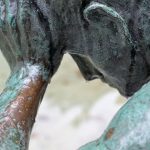 EPISODE SUMMARY:
EPISODE SUMMARY:
In season 3 episode 6 of the Eudo Podcast, we turn to the topic of the imagination. Listen on as Dr. Paul M. Gould discusses the role of the imagination in cultivating the Christian life.
EPISODE NOTES:
What is the Imagination?
Philosophers, theologians, and artists offer differing accounts of the imagination.
- There is broad consensus on what imagination is not: it is different from and irreducible to memory, perception, and belief.
- It is, however, similar in important ways to memory, perception, and belief, most notably imagining is also “a representational state.”
- Most who study the nature of imagination also agree that it is crucial to our lives, playing a significant role in perceiving, creating, dreaming, meaning, judging, learning, and moralizing.
Let’s consider some definitions offered by theologians, artists, and philosophers:
- According to the ancient philosopher Aristotle, the imagination is an intermediary between the sense organ and the intellect, “that in virtue of which we say an image [phantasma] arises in us.”
- The Enlightenment philosopher Kant argued that “the power of imagination, as a faculty of intuition without the presence of the object, is either productive . . . or reproductive.”
- The 19th century Romantic poet Samuel Taylor Coleridge viewed the imagination as a bridge between the human mind and the Supernatural.
- Picking up this romantic thread, S. Lewis argues in the 20th century that while reason is “the natural organ of truth,” it is the imagination which is “the organ of meaning.”
- Lewis’s friend R. R. Tolkien focuses on the creative capacities of the imagination when he states in his essay “On Fairy-Stories” that the imagination is a power to form “mental images of things not actually present … but [in its highest use] which are indeed not to be found in our primary world at all, or are generally believed not to be found there.”
- In an important work on the nature of worship, contemporary Calvin College philosopher James K. A. Smithemphasizes the passive and responsive character of the imagination (without denying the more active and creative powers of the imagination) when he describes the imagination as “a kind of faculty by which we navigate and make sense of our world, but in ways and on a register that flies below the radar of conscious reflection, and specifically in ways that are fundamentally aesthetic in nature.”
My own definition of the imagination: The imagination is (i) a faculty of the mind (ii) which mediates between sense and intellect (i.e., perception and reason) and the human mind and the divine Mind (i.e., finite creatures and the infinite Creator) (iii) for meaning and inventing.
C.S. Lewis and His Understanding of the Imagination
In order to understand Lewis’s use of imagination in apologetics, it is important to understand his view of the human person. Lewis sometimes pictures the human person as three concentric circles, the outermost ring being imagination, the middle ring reason, and the core being the will.
The imagination is the “ground floor” of the human soul. The basement is our “sensations” that provide, along with the imagination, the “raw material” for reason, which is for Lewis “the natural organ of truth.”
Imagination, which is good, serves reason, which is better, and both serve the will, which is best of all.
The Role of imagination in Lewis’s Personal Journey
Both the imagination and reason had to be satisfied before the core part of him, his ‘command centre’, the will, could turn about and receive supernatural truth.
- Imagination is necessary in apologetics. Reason cannot work without imagination
- Imagination is insufficient without reason. Imagination (along with sensation) provides the raw materials for reason, the “natural organ of truth.”
- (Imaginative) reason is also insufficient. Reason is not “the organ of truth” but the “natural organ of truth”—it cannot attain the supernatural in its own strength.
CONCLUDING REMARKS:
As the Catholic Theologian John Navone put it, as he considered Jesus as poet and story teller, “The road to the Kingdom is by way of the imagination by way of parables for those who have ears to hear, by way of stories which are like a poem with an in-meaning that is its own guarantee.” We’ll explore the connection between story, the imagination, and the gospel, in our next episode.
RESOURCES MENTIONED:
- Aristotle, De Anima
- Samuel T. Coleridge, Biographia Literaria
- Immanuel Kant, Anthropology from a Pragmatic Point of View
- Amy Kind, “Introduction: Exploring Imagination,” in The Routledge Handbook of Philosophy of Imagination
- C. S. Lewis, “Bluspels and Flalansferes: A Semantic Nightmare,” in Selected Literary Essays
- ______, Surprised by Joy
- Colin McGinn, Mindsight
- John Navone, Seeking God in Story
- James K. A. Smith, Imagining the Kingdom
- J. R. R. Tolkien, “On Fairy-Stories,” in The Tolkien Reader




